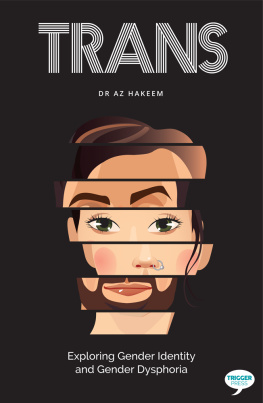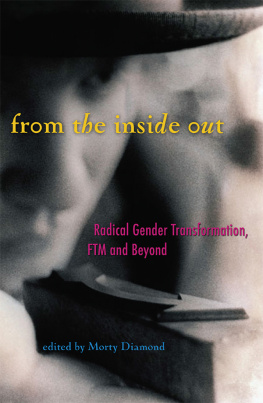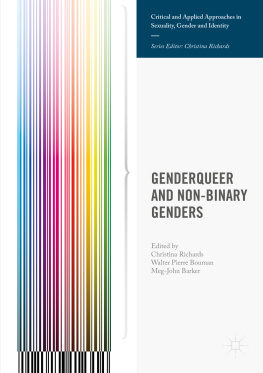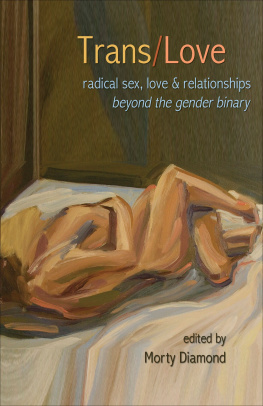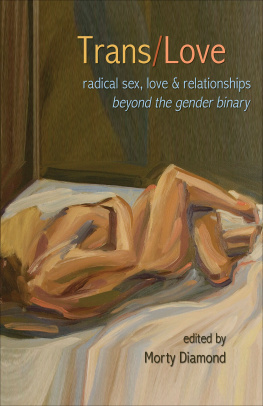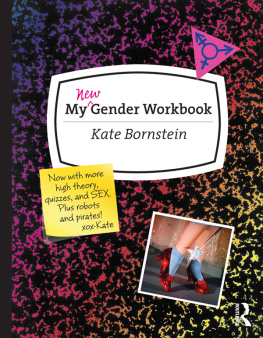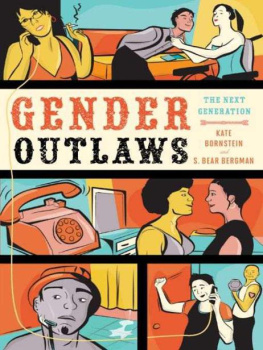

Praise for Read My Lips
Read My Lips is brilliant, spirited, and defiant. Wilchins has made a very serious political topic highly readable, enlivening it with her mordant wit.Loren Cameron
In this wonderfully provocative book, Riki Wilchins refuses the traps and cages of a gender-specific society and does it in a way that promises greater freedom for us all. With its belief in the richness of gender contradictions and fluidity.Joan Nestle
This is a deeply intelligent and iconoclastic vision rooted in personal experience and rigorous intellectual analysis of that experience. I was enlightened, confused, angry, and provoked from cover to cover.Sarah Schulman

Camp Trans at Michigan Womyn's Music Festival
Hart, Michigan
August 1994
Also by Riki Wilchins
Queer Theory, Gender Theory
Genderqueer: Voices from Beyond the Sexual Binary
(edited with Clare Howell and Joan Nestle)
Copyright 1997 by Riki Wilchins
Foreword copyright 2013 by Julia Serano
Magnus Books
An Imprint of Riverdale Avenue Books
5676 Riverdale Avenue, Suite 101
Riverdale, NY 10471
All rights reserved. No part of this book may be reproduced or transmitted in any form or by any means, electronic or mechanical, including photocopying, without permission in writing from the publisher.
Printed in the United States of America
Originally published by Firebrand Books
First Magnus/Riverdale Avenue Books Edition 2013
Cover by: Scott Carpenter
Interior Layout by www.formatting4U.com
All photographs by Mariette Pathy Allen
Print ISBN: 978-1-936833-64-1
Digital ISBN: 978-1-936833-65-8
www.riverdaleavebooks.com
To Clare Howell
It was my incredible good luck to find in you someone with the same vision and just as desperate for these words. We walked towards the same rainbow, but, while my eyes looked up, you kept yours on the map and guided us both home.
Without you, this book would never have been written. So this is for you, Clare, and all the others we know still out there, desperate, disheartened, but still anxiously searching the skies, hopeful for any sign of that rainbow.
C o n t e n t s
Whence come I
and on what wings
that it should take me so long,
humiliated and exiled,
to accept that I am myself?
Colette, The Vagabond
Foreword
Julia Serano
I have a very vivid memory of reading Riki Wilchinss Read My Lips: Sexual Subversion and the End of Gender for the first time. It was early in 2002, and I had shown up early to a poetry slam in Berkeley, California. At the time, I did not yet consider myself to be a writer, spoken word performer, or an activist. But I had a ton that I wanted to say. I had just been through the most tumultuous year of my life: in 2001, I began transitioning from male to female, and coming out to people in my life as trans. While that was all strange and intense, it was nothing compared to the surreal experience of (over the course of a year) moving from someone who was generally perceived and treated as male, to never knowing for sure whether people were reading me as female or male, to finally reaching the point where people were viewing and treating me as female on a regular basis.
I wanted to write about all these experiences, but language seemed to utterly fail me. Trans folks often frame our lives in terms of an isolated, miserable, pre-transition period, followed by a happy, well-adjusted, post-transition life. I could certainly relate to this narrative to a certain extent: I felt much more comfortable in my own skinhonestly, you couldnt pay me enough to go back. But becoming a woman was hardly a happy ending. Now instead of getting harassed by people for being a somewhat feminine man, I suddenly found myself fending off sexually harassing comments from men, or having homophobes angrily shout dyke! at me and my wife as we walked down the street holding hands. In other words, I was still grappling with gender on a daily basis; it was just the specific accusations and obstacles I faced that had changed.
In the years before my transition, I was inspired by books by Kate Bornstein and Leslie Feinberg, which encouraged me to embrace existing outside the male/female binary, and to not limit myself to behaving solely in conventionally feminine or masculine ways. Their words helped give me the strength to move unabashedly through the world as a feminine man, and later, as an out, tomboyish, trans woman. But the problem that I was now facing had less to do with me trying to squeeze myself into the man or woman box, and more to do with me having to constantly juggle a variety of different expectations depending upon whether other people presumed that I was a woman or man, queer or straight, or trans or non-trans. No matter where I went, there was always some set of gendered meanings and assumptions stalking me, only now they seemed extremely fluid, contextual, and arbitrary.
So these were some of the thoughts that had been racing through my mind in the wake of my transition. And so that evening just before the poetry slam, when I began reading Read My Lips, it immediately resonated with me. I felt like I had finally found a book that had the answers that I was seeking. But these werent the typical answers that most people expect to hear. Wilchins offers no simple, straightforward recipe for how to be happy with our genders, or how to perform our genders in conventionally appealing or politically righteous ways. Rather, the answers Wilchins offers take the form of further questioning, encouraging us to critically examine the mundane, everyday aspects of gender and sexuality that we usually take for granted. She implores us to look beyond bodies, and instead to see the many unsolicited meanings that are constantly being projected onto us and that enable us to see ourselves (and others) as gendered and sexual beings. As she says at one point in the book, our bodies end up being a projection screen for everyones unfinished business.
Read My Lips helped me to make sense of many of my own personal experiences with gender. But more importantly, it pulled back the curtain, and made the arbitrary (and often invalidating) production of gender and sexual meanings appear visible. It gave me the tools to understand and articulate what I was already beginning to suspect: that most facets of gender are rooted more in the processes of perception and interpretation than in anything physical or tangible.
In preparation to write this foreword, I pulled my copy of Read My Lips off my bookshelf, eleven years since I had first read it, and sixteen years since it was initially published. Much of it still feels very contemporary. The chapters that critically examine gendered meanings and assumptionssuch as, What Does It Cost to Tell the Truth? A Fascism of Meaning, Imaginary Bodies, Imagining Minds, and Eroticism: On the Uses of Differenceare as vital and relevant as ever. Other chapters discuss the psychiatric pathologization of gender variance, the exclusionary nature of identity politics, and how academics often abstractly theorize about transgender and intersex people without ever addressing the reality of our lived experiencesthese are all issues that activists are still grappling with today.
Next page

